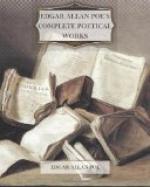[Footnote 12:
Seltsamen Tochter Jovis
Seinem Schosskinde
Der Phantasie.
’Goethe’.]
[Footnote 13: Sightless—too small to be seen.—’Legge’.]
[Footnote 14: I have often noticed a peculiar movement of the fire-flies; they will collect in a body and fly off, from a common centre, into innumerable radii.]
[Footnote 15: Therasaea, or Therasea, the island mentioned by Seneca, which, in a moment, arose from the sea to the eyes of astonished mariners.]
[Footnote 16:
Some star which, from the ruin’d
roof
Of shak’d Olympus, by mischance
did fall.
’Milton’.]
[Footnote 17: Voltaire, in speaking of Persepolis, says,
“Je connais bien l’admiration
qu’inspirent ces ruines—mais un palais
erige au pied d’une chaine de rochers
steriles—peut-il etre un chef
d’oeuvre des arts!”]
[Footnote 18: “Oh, the wave”—Ula Deguisi is the Turkish appellation; but, on its own shores, it is called Baliar Loth, or Al-motanah. There were undoubtedly more than two cities engulphed in the “dead sea.” In the valley of Siddim were five—Adrah, Zeboin, Zoar, Sodom and Gomorrah. Stephen of Byzantium mentions eight, and Strabo thirteen (engulphed) —but the last is out of all reason. It is said (Tacitus, Strabo, Josephus, Daniel of St. Saba, Nau, Maundrell, Troilo, D’Arvieux), that after an excessive drought, the vestiges of columns, walls, etc., are seen above the surface. At ‘any’ season, such remains may be discovered by looking down into the transparent lake, and at such distance as would argue the existence of many settlements in the space now usurped by the “Asphaltites.”]
[Footnote 19: Eyraco-Chaldea.]
[Footnote 20: I have often thought I could distinctly hear the sound of the darkness as it stole over the horizon.]
[Footnote 21:
Fairies use flowers for their charactery.
’Merry Wives of Windsor’.]
[Footnote 22: In Scripture is this passage:
“The sun shall not harm thee by day, nor the moon by night.”
It is, perhaps, not generally known that the moon, in Egypt, has the effect of producing blindness to those who sleep with the face exposed to its rays, to which circumstances the passage evidently alludes.]
[Footnote 23: The Albatross is said to sleep on the wing.]
[Footnote 24: I met with this idea in an old English tale, which I am now unable to obtain and quote from memory:
“The verie essence and, as it were,
springe heade and origine of all
musiche is the verie pleasaunte sounde
which the trees of the forest
do make when they growe.”]
[Footnote 25: The wild bee will not sleep in the shade if there be moonlight. The rhyme in the verse, as in one about sixty lines before, has an appearance of affectation. It is, however, imitated from Sir W. Scott, or rather from Claud Halcro—in whose mouth I admired its effect:




